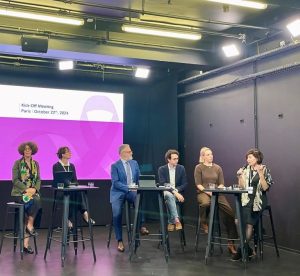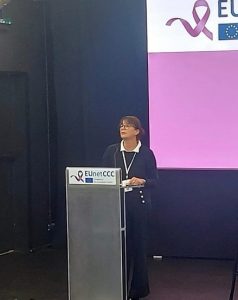EUnetCCC JA
The European Network of Comprehensive Cancer Centers
The European Network of Comprehensive Cancer Centers
In line with the fifth flagship initiative of the European Cancer Plan, the European Network of Comprehensive Cancer Centres will be established in the coming years as part of the EUnetCCC joint action project. By 2030, the majority of cancer patients are expected to have access to the new European Network of Comprehensive Cancer Centres, which will help reduce cancer-related inequalities in the EU and provide patients with higher quality care closer to home.

Link to websites: https://ecc-cert.org/health-service-research/eunetccc/
The European Network of Comprehensive Cancer Centres (EUnetCCC), which will be established as part of the EUnetCCC Joint Action (EUnetCCC JA) project, focuses on research, treatment, and education in the field of cancer. The establishment of the European Network of Comprehensive Cancer Centres represents a coordinated and integrated approach to cancer treatment across the continent. The initiative is based on the principles of excellence and collaboration. The multidisciplinary approach will provide patients with the benefits of the latest scientific achievements: from early disease detection to innovative treatments and post-treatment care. This is an implementation project of the joint action within the framework of the fifth flagship initiative of the European Cancer Plan.
Purpose of the project and project objectives
The primary goal of the EUnetCCC JA project is to establish a coordinated and integrated consortium of comprehensive cancer centers across Europe, providing patients, regardless of their location, access to high-quality care. This network will also serve as a platform for collaboration, sharing best practices, resources, and knowledge. Such collaboration is essential for promoting research, integrating the latest findings into clinical practice, and ensuring that patients benefit from the most effective forms of treatment. In line with the European Cancer Plan, by 2030, 90% of cancer patients should have access to the new European Network of Comprehensive Cancer Centres, which will help reduce cancer-related inequalities in the EU and provide patients with higher quality care closer to home.
Benefits of the Project for Slovenia
As part of the EUnetCCC JA project, a national network of centers will be established in our country, which is one of the possible forms of comprehensive cancer centers. The national network will consist of a consortium made up of the University Medical Centre Ljubljana, University Medical Centre Maribor, both Medical Faculties (Ljubljana and Maribor), the Golnik Clinic, which specializes in the treatment of lung cancers, the Institute of Oncology, and the National Institute of Public Health (NIJZ).
The project work is organized into nine work packages (WP) and several sub-packages:
WP 1 – Project management and coordination;
WP 2 – Communication;
WP 3 – Evaluation;
WP 4 – Sustainability;
WP 5 – Inclusion, Certification and Adherence to EUCCC Network;
WP 6 – Strengthening Capacities and Quality Improvement in EUCCC;
WP 7 – Governance, Membership and Engagement of the EU Network of CCCs;
WP 8 – Development and implementation of Network Activities;
WP 9 – Support the implementation of Comprehensive Cancer Care Networks (CCCNs) to ensure comprehensive, high-quality cancer care for all patients.
Intensive work on this large and demanding project began in October 2024.
The network will facilitate the adoption of high-quality diagnostic and therapeutic methods, including training, research, and clinical trials across the EU. It is expected to contribute to:
(a) Reducing inequalities in diagnostics, treatment, care, and access to clinical trials;
(b) Strengthening the quality of research outcomes;
(c) Integrating clinical care and research, as well as evaluating the European quality of cancer care.
This described European collaboration will improve patients’ access to high-quality diagnostics, care, and innovative treatments. Guidelines, protocols, best practices, or other materials developed within the CraNE Joint Action project, as well as related projects such as the Network of Expertise (JANE JA), Comprehensive Cancer Infrastructure in Europe (CCI4EU), and European Reference Networks (ERN), will be used.
Europe’s beating Cancer Plan: https://health.ec.europa.eu/system/files/2022-02/eu_cancer-plan_en_0.pdf
Duration of the project: From 1st of October 2024 to 30th of September 2028.
Leading organization: INSTITUT NATIONAL DU CANCER GIP (INCa), France.
Project partners: The project includes 161 partners from 31 countries. The Slovenian part of the consortium is led by the Institute of Oncology Ljubljana, in collaboration with the University of Ljubljana, University Medical Centre Ljubljana, University of Maribor, University Medical Centre Maribor, the National Institute of Public Health, and the University Clinic for Pulmonary Diseases Golnik.
Funding: The European Commission, EU4Health Programme (EU4H) under the Cooperation Agreement No. 101183407. Co-financed by the European Union and the Ministry of Health of the Republic of Slovenia. Total project value: 112,012,503.62 EUR, NIJZ share: 1,337,895.90 EUR.
Disclaimer: Funded by the European Union. The views and opinions expressed are those of the authors and do not necessarily reflect the views and opinions of the European Union or the European Health and Digital Executive Agency (HaDEA). Neither the European Union nor the body that co-finances the campaign can be held responsible for them.

